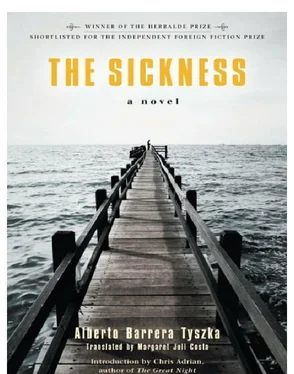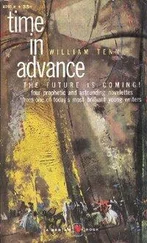“What are you getting at with all this? What did you do?”
“Do you know what happened? We decided to take the risk. All of us in the unit. If anyone had found out, we would have been in big trouble. The media would have had a field day, but that didn’t frighten us; we decided to take the risk anyway. I took it on myself to speak to Efraín’s family, to his wife and his eldest daughter. It was rather awkward, as you can imagine, one of those conversations in which no one says exactly what they mean; we spoke as if in code. There was a silent, secret pact. Efraín agreed to it too. He would go home, stop coming to dialysis, and that would be that. But it came to nothing. It all fell flat. And do you know why? Because we needed a signature, we needed one member of Efraín’s family to sign a piece of paper, saying that Efraín Salgado had stopped coming to the dialysis unit of his own free will. It was just a way of protecting ourselves, so that no one else in his family could come to us later and accuse the unit of refusing to help a patient.”
“And what happened?”
“No one would sign! Not one of his relatives would dare! They felt that by signing that piece of paper, they were confessing to a crime. And it was that one apparently foolish, trivial thing that brought the whole plan crashing down. What I considered to be a mere bureaucratic detail, a mere formality once we had sorted out the really important matter, became for them a kind of definitive symbol. The person who signed that paper would somehow be responsible for his death, would have Efraín’s corpse on his or her conscience. As if scribbling your name on a sheet of paper would immediately convert that act into a crime. At least, I think that’s what they felt. They needed to be able to turn a blind eye, they needed everything to happen as if by chance, as if it really were unintentional. They needed to feel that the old man was dying of his own accord, without any of them knowing anything about it.”
Miguel orders some curried prawns. Andrés isn’t hungry, he sits there mute and absent. His cell phone rings. He checks to see who’s calling and decides not to answer. The phone continues to ring on the table. It’s a pointless, futile sound. Andrés doesn’t offer an explanation, he just sits and says nothing. Miguel looks at him and suddenly feels rather embarrassed.
“I don’t really know why that story came into my mind,” he says, somewhat regretfully. “I don’t know why I told it to you. What connection does it have with your father and with what we’ve been talking about?”
“I’m not sure,” says Andrés. “But perhaps there is a connection.”
Miguel shakes his head.
“No, I just suddenly remembered it and felt like telling you, although now I really don’t know why. I’m sorry.”
Deep down, Miguel would like to take back that anecdote, to feel around on the floor for the crumbs of that story and return it intact to his memory. What made him think of it? Why had he got so carried away and told Andrés? It really wasn’t what his friend needed just then. It wasn’t what he was hoping for from him. He had asked to meet in order to tell him that his father has cancer, that his father’s going to die, and instead of being supportive and consoling, there he was telling him that macabre tale about a man who wants to die and about a wife and children who want their husband and father to die as well. Why? What for?
“Don’t worry, it’s alright.” Andrés shakes his head again. His eyes are sad, but he’s smiling slightly.
“No, it’s not alright. There you are, in a state of complete shock and what do I do? I start telling you some entirely irrelevant story.”
The waiter comes over with the bill, and the usual battle of the credit cards ensues, the battle to decide who pays. Miguel insists on making the bill his penance, and he wins. When the waiter leaves, Andrés says to Miguel, “I know what made you think of that story.”
Miguel listens, but continues to shake his head.
“Basically,” Andrés goes on, “your memory came up with a story about how dying isn’t as easy as it seems. That sometimes knowing what’s happening or about to happen doesn’t help. Nothing more. The word ‘death’ casts a very unpredictable spell. ‘Keep the truth from your dad. Don’t tell your dad the truth,’ that’s what you were saying.”
While Miguel makes a visit to the bathroom, Andrés thinks that perhaps this is one of the most tragic consequences of illness: it destroys all other appearances, it won’t allow death to dissemble, it ruins any chance of death taking place as if nothing at all or else something entirely different were happening.
By six, Andrés is on his way back home, caught up in a terrible traffic jam on the highway heading to the south of the city. All five lanes are completely blocked. It’s the typical urban image that appears to fascinate so many people: hordes of cars, one after the other, all breathing slowly beneath the indifferent, mustard-colored sun. For the first time in that whole painful situation, Andrés doesn’t feel gripped by bad temper or by the need to get home as soon as possible and to have a sense that the day is finally over. Perhaps it’s the effect of the whisky. On the passenger seat lie his father’s X-rays. Andrés is briefly aware of them in his peripheral vision. He closes his eyes. Only for a second. His eyelids feel stiff and painful. He knows what’s going to happen and that it’s inevitable. In a stupid, futile gesture, he turns on the radio, trying to stop the unstoppable. He flips from station to station, but they’re of no use, those intersecting voices and songs. He can already feel the tears pricking at the edges of his pupils. It’s unpleasant. It stings. He’s crying, but he’d also like to scream, to thump the steering wheel. His saliva has grown thick. He can’t hold back now, he can’t stop crying. He doesn’t know how.
Dear Dr. Miranda,
I don’t know how much longer I’ll have to wait for an answer. I thought that, after my second letter, you would reply within a day or two. Not so. I’ve been making some enquiries and I’ve been told that e-mails do sometimes go astray, that it often happens. This means that perhaps you did reply to me, but your reply got lost and ended up in someone else’s inbox, for example. It also occurred to me that perhaps it would be best if I printed out these letters and went in person to the hospital to give them to you. Although, before I do that, I would much prefer it if we could get this system to work and you could at least tell me whether or not you’ve received my messages. That’s all I need: for you to send a letter with a “Yes” or a “No,” nothing more, just that. Then at least I’d know we were in touch.
While I’ve been waiting for your response, I’ve been considering our relationship and trying to recall if there was anything I did that might have offended you, that could possibly have produced a reaction like this. Is it possible that you receive and read my letters, but don’t wish to answer me, that you want nothing more to do with me? Is what your secretary says right? I’ve gone over and over it in my mind and that just doesn’t seem possible. It doesn’t make sense. You couldn’t do that to a sick man. At least, that’s how I feel, how I still feel.
As I mentioned in my previous letter, all I ask of you is a little of the same trust I placed in you. You told me I was in perfect health, that there was no way I would faint, and I trusted you. And I did actually feel better for a day or two. On the third day, though, the dizzy spells came back. I remember it perfectly. I was leaving work and was walking down Avenida Solano. It was midday and very hot and sunny. I was feeling perfectly fine, when, suddenly, at a corner of the street, I was gripped again by the same symptoms. I was terrified. I thought I would collapse right there and then. My hands were cold, my head was sweating, and I found it hard to swallow. I had the sense that everything around me was about to start moving, that I was losing my balance. That was the first time I phoned you. I didn’t know what else to do. Surely you remember. I told you it was an emergency, I explained what was happening. You were really surprised. I’m sure you remember that. You told me to stay calm and to describe what I was feeling. I was in such a state. I told you I was going to faint. Then all I could do was hail a passing taxi, bundle myself inside and ask to be taken at once to the emergency room. I know you were a bit put out on that occasion. You showed me all the test results. Everything was normal. I was fine. I didn’t know what to say. But I felt safe in the hospital, knowing you were near and that if anything happened to me, you would be there for me.
Читать дальше












